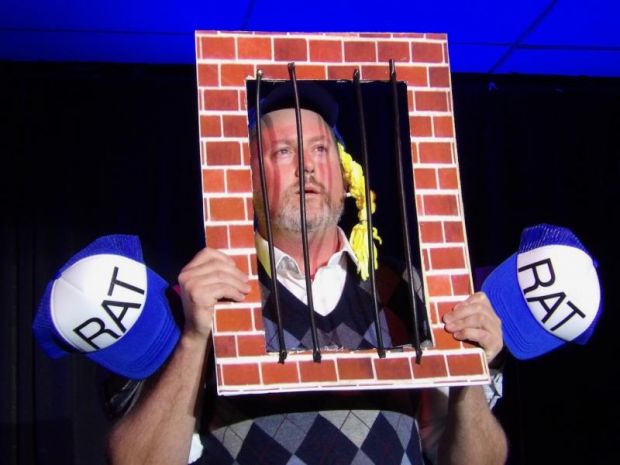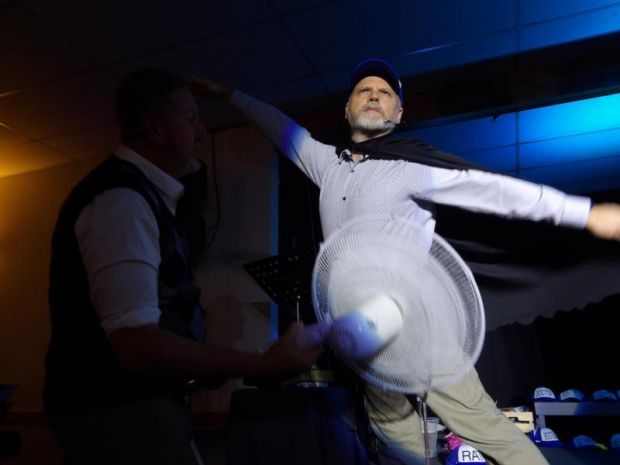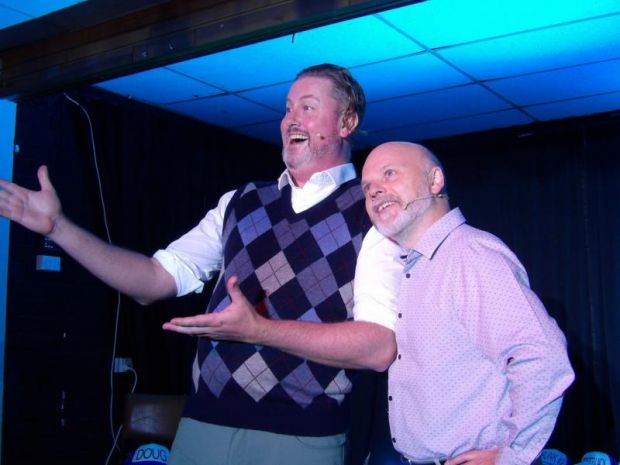Gutenberg: The Musical
Gutenberg: The Musical is an unusual piece of theatre. Authors Brown and King have written together since high school and are best known for the lyrical content of Beetlejuice: The Musical. Anticipate the same clever word play, terrible puns, the occasional groan.
Gutenberg: The Musical is a spoof. Its self-awareness is some of its charm. For those who know their musical theatre well, Gutenberg exploits all the tropes. It makes no bones about introducing a controversial element (a gasp of horror is elicited from the audience by one particular action, late in Act 2) to make itself “important”. There may be little hints of familiar songs (the lyrics to “One Day More” can be interpolated nicely into “Festival”) but the catchy tunes choose to mimic the styles of other shows rather than exploit them. The cast discuss metaphor and leitmotif. Dance numbers are interposed. The standard musical structure is parodied. The opening ensemble number of “Schlimmer” (Schlimmer being Gutenberg’s hometown) feels like the exposition from Beauty and the Beast. The highly irrelevant song, “Biscuits”, is described as a “charm song” which is used to divert the audience from the real business, often providing a cameo opportunity for a well-known actor. It’s an old idea: Shakespeare’s clowns fall into the same category. There is an “Eleventh Hour Song” (the huge crisis Joseph Campbell would describe as the “Supreme Ordeal”) in the form of Helvetica’s “Go to Hell”. For those initiated into these mysteries, another level of humour is added. For those untutored a layer of meaning is lost. My companion on opening night had never heard the joke about Maria Von Trapp and the Mother Abbess before. They looked at me blankly and I was sad for them.

The above is delivered in a little over two hours by two energetic and charismatic actors. This physical and mental challenge for Gerard Lane and Christopher Bryg must be applauded. The conceit of the show is that Lane and Bryg (as Bud and Doug) are pitching a show they have written to an audience of potential investors. To economise, Bud and Doug play every role in their epic musical, themselves. With the use of labelled caps and dozens of accents and silly voices, the numerous characters are clearly defined. Gutenberg (Lane) is a Cockney, but the Boot Black sounds like Crocodile Dundee. The Little Flower Seller is German, but the Evil Monk (Bryg) channels the Emperor Palpatine. Bryg and Lane never flag through frantic patter, huge production numbers (with dancing rats) and well-rehearsed stage business. They have excellent stage chemistry.
Many properties must be manipulated. The props created by director, Matt Taylor, and Stage Manager, Jackson Kelder, look like Children’s Clip Art printed on board. The joke could get old, but it doesn’t. The audience is asked to imagine what is indicated and it works.

The musical ensemble under Kellie Cutler is integral and solid. Piano, Percussion and Keyboard (for synthesized nuance) support the performers in a range of familiar Musical Theatre styles. The sound design is adequate for the venue and the balance of vocals and ensemble is excellent. The venue is disappointing in terms of the possibilities for lighting. Lighting, best adapted for an 80s disco, was often as distraction and hindrance, despite best efforts.
The laughs are thick and fast. Much of the humour is slap stick and physical but largely inoffensive. Have we, as audiences, moved beyond gay stereotyping? It would be nice to think so. The story careens to an end with a surprise cameo.

Gutenberg: The Musical is ridiculous, self-aware, and an excellent vehicle for the comedic talents of Gerard Lane and Christopher Bryg.
Review by Anne Blythe-Cooper
Photo credit: Jacquie Coad
Subscribe to our E-Newsletter, buy our latest print edition or find a Performing Arts book at Book Nook.
